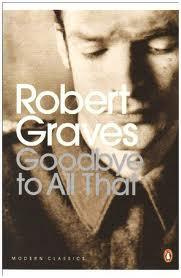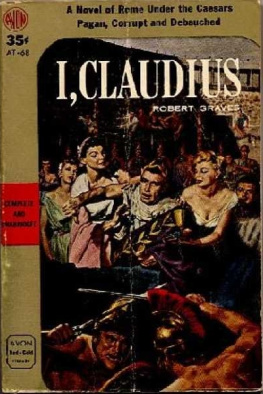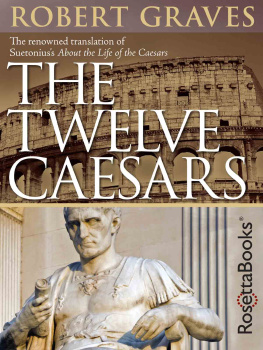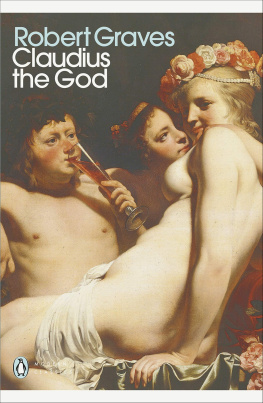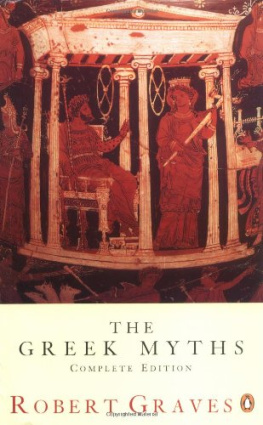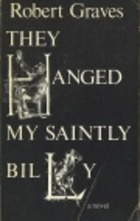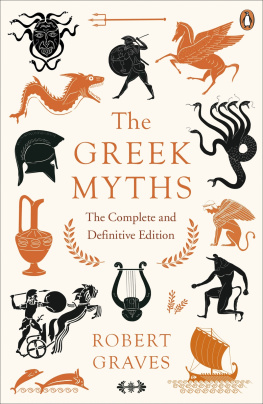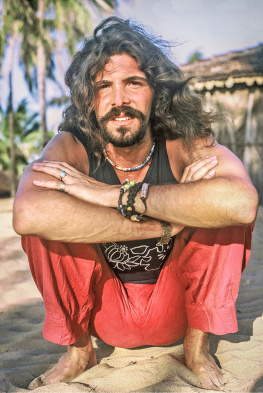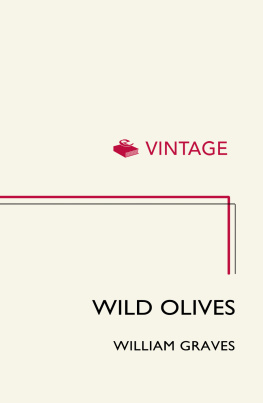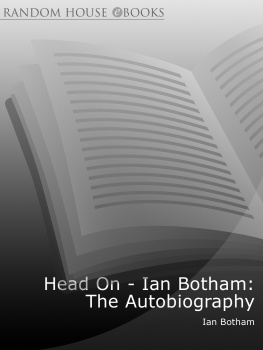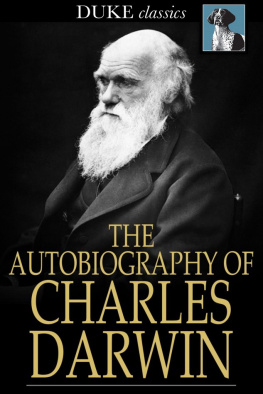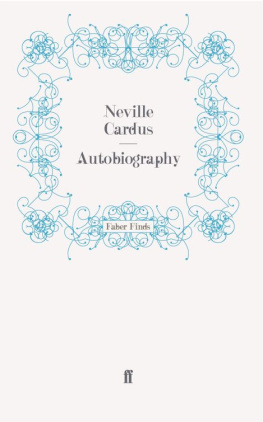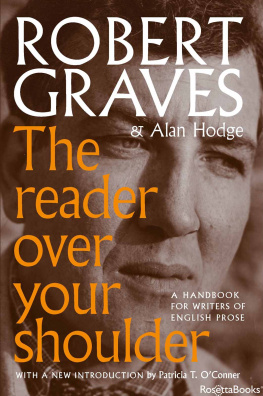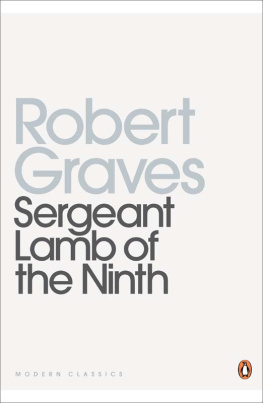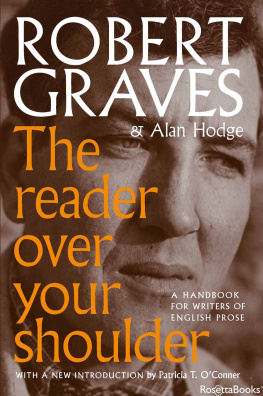
PENGUIN BOOKS
Goodbye to All That
Robert Graves was born in 1895 in Wimbledon, son of Alfred Perceval Graves, the Irish writer, and Amalia Von Ranke. He went from school to the First World War, where he became a captain in the Royal Welch Fusiliers. His principal calling was poetry, and his Selected Poems have also been published in Penguin. Apart from a year as Professor of English Literature at Cairo University in 1926 he earned his living by writing, mostly historical novels which include: I, Claudius; Claudius the God; Count Belisarius; Wife to Mr Milton; Sergeant Lamb of the Ninth; Proceed, Sergeant Lamb; The Golden Fleece; They Hanged My Saintly Billy; and The Isles of Unwisdom. He wrote his autobiography, Goodbye to All That, in 1929, and it rapidly established itself as a modern classic. The Times Literary Supplement acclaimed it as one of the most candid self-portraits of a poet, warts and all, ever painted, as well as being of exceptional value as a war document. His two most discussed non-fiction books are The White Goddess, which presents a new view of the poetic impulse, and The Nazarine Gospel Restored (with Joshua Podro), a re-examination of primitive Christianity. He translated Apuleius, Lucan, and Suetonius for the Penguin Clsassics, and compiled the first modern dictionary of Greek Mythology, The Greek Myths. His translation of The Rubiyt of Omar Khayym (with Omar Ali-Shah) was also published in Penguin. He was elected Professor of Poetry at Oxford in 1961, and made an Honorary Fellow of St Johns College, Oxford, in 1971.
Robert Graves died on 7 December 1985 in Majorca, his home since 1929. On his death The Times wrote of him, He will be remembered for his achievements as a prose stylist, historical novelist and memorist, but above all as the great paradigm of the dedicated poet, the greatest love poet in English since Donne.
ROBERT GRAVES

Goodbye to All That

PENGUIN BOOKS
PENGUIN BOOKS
Published by the Penguin Group
Penguin Books Ltd, 80 Strand, London WC2R 0RL, England
Penguin Putnam Inc., 375 Hudson Street, New York, New York 10014, USA
Penguin Books Australia Ltd, 250 Camberwell Road, Camberwell, Victoria 3124, Australia
Penguin Books Canada Ltd, 10 Alcorn Avenue, Toronto, Ontario, Canada M4V 3B2
Penguin Books India (P) Ltd, 11 Community Centre, Panchsheel Park, New Delhi 110 017, India
Penguin Books (NZ) Ltd, Cnr Rosedale and Airborne Roads, Albany, Auckland, New Zealand
Penguin Books (South Africa) (Pty) Ltd, 24 Sturdee Avenue, Rosebank 2196, South Africa
Penguin Books Ltd, Registered Offices: 80 Strand, London WC2R 0RL, England
www.penguin.com
First published by Jonathan Cape 1929
Revised edition, with new Prologue and Epilogue, published by Cassel 1957
Published in Penguin Books 1960
Reprinted in Penguin Classics 2000
Copyright 1929 by Robert Graves
Copyright Robert Graves, 1957
All rights reserved
Except in the United States of America, this book is sold subject
to the condition that it shall not, by way of trade or otherwise, be lent,
re-sold, hired out, or otherwise circulated without the publishers
prior consent in any form of binding or cover other than that in
which it is published and without a similar condition including this
condition being imposed on the subsequent purchaser
LIST OF ILLUSTRATIONS
. Robert Graves in Majorca. ( Tom Weedon ). Robert Graves, from a portrait by Eric Kennington. ( By kind permission of the artist ). Charterhouse School in 1914. Bthune before the shelling, 1915. ( Imperial War Museum ). The brickstacks at Cuinchy. ( Imperial War Museum ). Somme Battle. The First Royal Welch Fusiliers attacking near Mametz, 1 July 1916. ( Imperial War Museum ). Somme trench map: Martinpuich section. ( Imperial War Museum ). Waterlogged mine crater. ( Imperial War Museum ). Somme Battle. Scene in a communication trench before an attack. ( Imperial War Museum ). Royal Welch Fusiliers at rest, 28 June 1916. ( Imperial War Museum ). Mametz village, July 1916. ( Imperial War Museum ). The Second Royal Welch Fusilier Goat and Band at the 33rd Division Horse Show, July 1917. ( Imperial War Museum )
PROLOGUE
I partly wrote, partly dictated, this book twenty-eight years ago during a complicated domestic crisis, and with very little time for revision. It was my bitter leave-taking of England where I had recently broken a good many conventions; quarrelled with, or been disowned by, most of my friends; been grilled by the police on a suspicion of attempted murder; and ceased to care what anyone thought of me.
Reading Goodbye to All That over again, for the first time since 1929, I wonder how my publishers escaped a libel action.
Domestic crises are always expensive, but the book sold well enough in England and the United States, despite the Depression which had just set in, to pay my debts and leave me free to live and write in Majorca without immediate anxiety for the future. The title became a catch-word, and my sole contribution to Bartletts Dictionary of Familiar Quotations.
A good many changes have been made in the text omission of many dull or foolish patches; restoration of a few suppressed anecdotes; replacement of the T. E. Lawrence chapter by a longer one written five years later; correction of factual misstatements; and a general editing of my excusably ragged prose. Some proper names have been restored where their original disguise is no longer necessary.
If any passage still gives offence after all those years, I hope to he forgiven .
Dey, Majorca, Spain, 1957 R.G.
Goodbye to All That
As a proof of my readiness to accept autobiographical convention, let me at once record my two earliest memories. The first is being loyally held up at a window to watch a procession of decorated carriages and waggons for Queen Victorias Diamond Jubilee in 1897 (this was at Wimbledon, where I had been born on July 24th, 1895). The second is gazing upwards with a sort of despondent terror at a cupboard in the nursery, which stood accidentally open, filled to the ceiling with octavo volumes of Shakespeare. My father had organized a Shakespeare reading circle. I did not know until long afterwards that this was the Shakespeare cupboard but, apparently, I already had a strong instinct against drawing-room activities. And when distinguished visitors came to the house, such as Sir Sidney Lee with his Shakespearean scholarship, or Lord Ashbourne, not yet a peer, with his loud talk of Ireland for the Irish, and his saffron kilt, or Mr Eustace Miles the English real-tennis champion and vegetarian with his samples of exotic nuts, I knew all about them in my way.
Nor had I any illusions about Algernon Charles Swinburne, who often used to stop my perambulator when he met it on Nurses Walk, at the edge of Wimbledon Common, and pat me on the head and kiss me: he was an inveterate pram-stopper and patter and kisser. Nurses Walk lay between The Pines, Putney (where he lived with Watts-Dunton), and the Rose and Crown public house, where he went for his daily pint of beer; Watts-Dunton allowed him twopence for it and no more. I did not know that Swinburne was a poet, but I knew that he was a public menace. Swinburne, by the way, when a very young man, had gone to Walter Savage Landor, then a very old man, and been given the poets blessing he asked for; and Landor when a child had been patted on the head by Dr Samuel Johnson; and Johnson when a child had been taken to London to be touched by Queen Anne for scrofula, the Kings evil; and Queen Anne when a child.
Next page
